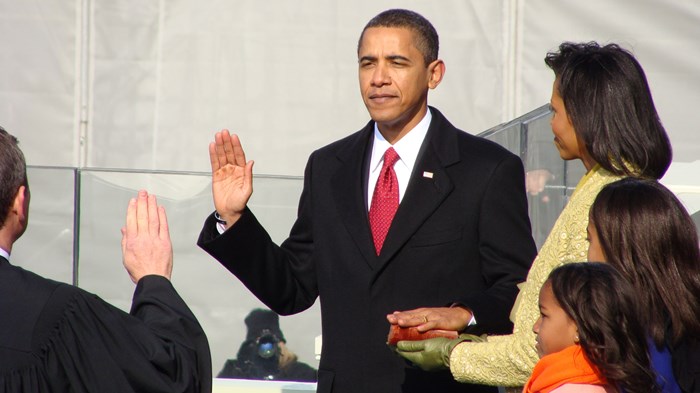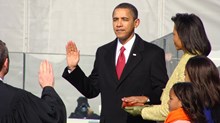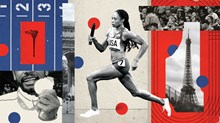
Christian History's issue on the American presidents included several great religious quotes from inaugural addresses.
Among them is the following quote from William Henry Harrison, who didn't get to do much as president other than give this speech (after delivering a long speech on a cold day, he came down with pneumonia and died a month into his term):
"I deem the present occasion sufficiently important and solemn to justify me in expressing to my fellow-citizens a profound reverence for the Christian religion and a thorough conviction that sound morals, religious liberty, and a just sense of religious responsibility are essentially connected with all true and lasting happiness …"
Also worth noting is Jimmy Carter's explicit reference to the Bible upon which he took the oath of office:
"I have just taken the oath of office on the Bible my mother gave me a few years ago, opened to a timeless admonition from the ancient prophet Micah: 'He hath showed thee, O man, what is good; and what doth the Lord require of thee, but to do justly, and to love mercy, and to walk humbly with thy God.'"
Those inaugural Bibles have been a source of much media attention in recent days.
Many have noted the odd verse upon which George Washington took his oath: "Zebulun shall dwell at the haven of the sea; and he shall be for an haven of ships; and his border shall be unto Zidon"(Gen. 49:13). Apparently the Bible was opened at random that day. No presidents have since chosen that particular verse as their model, but several–Warren Harding, Dwight Eisenhower, and George H.W. Bush–have picked Washington's Bible. Actually, so did Jimmy Carter. He, Eisenhower, and Bush all used two Bibles–the Washington Bible and a family Bible. George W. Bush had wanted to use the Washington Bible in his 2001 inauguration, but the weather was too poor to expose the historic Bible to the elements.
The story goes that Washington was all set for his inauguration when it was decided he should take the oath on a Bible. But none was readily available at the ceremony, so Jacob Morton, Master of St. John's Masonic Lodge, rushed to go get one from the Masonic temple.
No Bible is actually required by the constitution – Theodore Roosevelt, for example, did not take his 1901 oath of office on a Bible or any other book after William McKinley's assassination. (By the way, in that famous photo of Lyndon Baines Johnson taking the oath after Kennedy's assassination, that's not a full Bible. That's a Catholic missal found in John F. Kennedy's Air Force One desk.)
Nor is "so help me God" part of the presidential oath of office. (It is, however, part of the official oath for federal judges and justices and several other federal employees.) The unverified (and historically questioned) story is that Washington ad libbed it. It first reliably appears at Chester Arthur's inauguration in 1881.
(What is part of the presidential oath is a promise "that I will faithfully execute the office of president of the United States." Chief Justice John Roberts tripped Barack Obama up on that "faithfully" part.)
Similarly to George Washington, Abraham Lincoln was nearly left without a Bible for his oath. He had arrived in Washington, D.C., without most of his belongings, so William Thomas Carroll, clerk of the Supreme Court, brought a Bible from his office. And like Washington's, Lincoln's Bible was turned to a verse at random. For his second inauguration, Lincoln was more specific and chose three verses on which to lay his hand: Matthew 7:1: "Judge not, lest ye be judged." Matthew 18:7; "Woe unto the world because of offences! for it must needs be that offences come; but woe to that man by whom the offence cometh!" and Revelation 16:7 "And I heard another out of the altar say, Even so, Lord God Almighty, true and righteous are thy judgments." (I'm not entirely certain how he placed his hand on all three verses, but he did have long fingers.)
It was on this Bible that Obama was sworn in today. Obama referenced Scripture in today's address. ("We remain a young nation, but in the words of scripture, the time has come to set aside childish things." It was a reference to 1 Cor. 13:11: "When I was a child, I spake as a child, I understood as a child, I thought as a child: but when I became a man, I put away childish things." Perhaps it was among the day's subtle references to Franklin D. Roosevelt, who took his oath on 1 Cor. 13.) But, at least from what I can tell, the Bible remained closed for the oath of office. (Other closed Bible users: Harry S. Truman, John F. Kennedy, Lyndon B. Johnson, and George W. Bush.)
The most popular verse for the oath is 2 Chronicles 7:14: "If my people, who are called by my name, will humble themselves and pray and seek my face and turn from their wicked ways, then will I hear from heaven and will forgive their sin and will heal their land." The Library of Congress says two presidents have used it. CNN says three.
This is the part of the blog post where I should probably come up with some beautiful summary of the importance of Scripture in American culture or perhaps some indication that Inauguration Day has resonances with church history as well as American history.
Instead, I'll make a cheap joke about how it sure looks like Rick Warren was present at McKinley's inauguration as well as Obama's (compare this photo with this one) and note a less auspicious historical resonance that has nothing to do with church history but will be irresistible to you history nuts. In 1873, more than 150 canaries were provided for the inauguration of Ulysses S. Grant. But it was so cold that day that each of them froze to death in their cages (also, the strings of the orchestra's instruments snapped). Exactly 100 years later, planners for Richard Nixon's inaugural thoughtfully applied a chemical called Roost-No-More to the trees along Pennsylvania Avenue. The chemical was supposed to give the birds itchy feet so they wouldn't sit around and poop on the crowds (or the President, for that matter). Instead the birds ate the chemical and died en masse, their corpses littering the parade route.
There are of course many other fun, non-religious facts about inaugurations past. We might, for example, compare the time when nobody bothered to pick up outgoing President Franklin Pierce for James Buchanan's inauguration with John Quincy Adams's refusal to attend Andrew Jackson's swearing in.
But it's getting late here on Inauguration Day, so I'll quote James Madison, who told a friend at his Inaugural Ball, "I would much rather be in bed."

Support Our Work
Subscribe to CT for less than $4.25/month




























